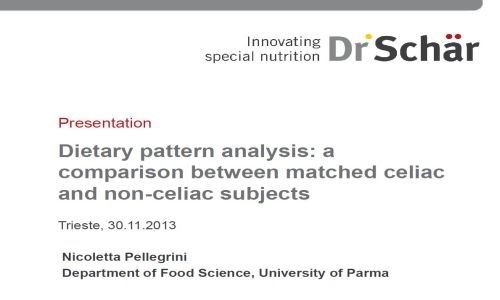Gluten-free and wheat-free diets as therapy

A gluten free diet is the only available treatment for the management of coeliac disease and non-coeliac gluten sensitivity. Wheat allergy requires the implementation of a wheat free diet, whereby all wheat-derived ingredients are avoided.
In order to ensure an accurate diagnosis, it is imperative that the patient does not initiate a gluten-free diet until a final diagnosis is obtained. Currently the only treatment for coeliac disease is lifelong strict adherence to a gluten-free diet. Strict adherence to the diet and careful monitoring of ingredients, food preparation, and reading of labels will help avoid any potential cross contamination and unintentional ingestion of gluten. In the case of non-coeliac gluten sensitivity, the initial treatment is a gluten-free diet. After a period of time following a gluten-free diet, individuals with non-coeliac gluten sensitivity may choose to consider reintroducing a small amount of gluten in to their diet under the guidance of a healthcare professional team. Those patients with a diagnosis of wheat allergy will require a wheat free diet but may be able to consider reintroduction at a later date, under the supervision of their healthcare professional team, depending on the nature and severity of their symptoms.
Implementation of a gluten-free or wheat-free diet by diagnosis
| Celiac disease | Gluten/wheat sensitivity | Wheat allergy | |
|---|---|---|---|
| Duration | Lifelong | Potentially limited time - at least one to two years | Potentially limited time |
| Special features | Strict gluten-free | With medical supervision a low-gluten may then be sufficient | Adjunctive medication may be necessary |
Gluten-free diet for coeliac disease
Currently the only therapy for coeliac disease is a strict lifelong gluten-free diet. If coeliac disease is not treated, it can lead to the development of other conditions, secondary symptoms, and increased risk of long term complications. Regular follow-ups with a health care professional are recommended to assess any changes that would affect the overall health and quality of life of the patient and prevent any nutritional deficiencies and complications.
Consultation with a specialist dietitian is the key to health and compliance
The transition to a gluten-free diet, may seem daunting for patients at first. A consultation with a suitably experienced dietitian is the key to health and compliance with the gluten-free dietary pattern. The dietitian will be able to guide patients through the transition to a healthy gluten-free diet. The session should include an in-depth assessment of current intake patterns. Tailoring advice to suit food preferences, dining out and social eating patterns is crucial in order to individualise recommendations for patients and their families. Practical resources and materials should be provided to patients in order to support compliance. For younger patients, the education and support offered might need to extend further, including consideration of other care givers – e.g nursery, school, college, friends and extended family.
Suggested points to discuss during initial dietetic consultation/s
- Confirm diagnosis - has a definite diagnosis been made, when and how?
- Other relevant medical history
- Explanation of diagnosis to reduce anxiety, provide reassurance and increase understanding
- What is coeliac disease?
- Advantages of a gluten-free diet and disadvantages of non-compliance
- Recommend membership of Coeliac UK
- Assessment of nutritional status and current diet
- Weight, height and BMI
- Results of blood analysis of vitamin/mineral status
- Dexa scan
- Diet history
- Discussion of gluten free diet:
- foods to include, foods to avoid , foods to check
- reading food labels
- General healthy eating advice
- Gluten-free foods on prescription – what’s available and how to access this
- Provide manufacturers contact information - advice on obtaining free samples
- Advice for eating out/ away from home
- Avoiding cross-contamination
Annual review
NICE Clinical Guidelines recommend that all coeliac patients are offered an annual review during which they should be provided with specialist dietetic and nutritional advice [1].
Suggested topics for discussion at dietetic review appointment/s
- Review of symptoms and response to treatment so far
- Consideration of additional food intolerances – management advice as appropriate
- Monitoring of nutritional status and dietary adequacy – advise as appropriate
- Weight, BMI
- Diet history
- Address any general questions and concerns
- Food labelling re-cap
- Advice for special occasions & travel
- Gluten free cooking/backing tips and advice
References
- NICE Guideline NG20: Recognition, Assessment & Management of Coeliac Disease. National Institute of Clinical Excellence 2015.
Further information on this topic
Professional articles
3
Show all
Presentations
1
Show all

Gut Microbiota in Health and Disease
As new evidence and better analytical techniques emerge, more information is becoming available about our gut bacteria. It is becoming clear that the type and relative amount of bacteria present in our gut plays an important role in both health and disease.
>> Read more... <<<
>> Read more... <<<

The Influence of the Microbiome on Gluten-Related Disorders
This short article provides an overview of the differences in microbiota which exist in gluten-related disorders, with a particular focus on coeliac disease. It goes on to outline a planned controlled prospective study which examines changes in intestinal microflora in patients with wheat sensitivity.
>> Read more... <<<
>> Read more... <<<

The importance of the microbiota in the pathogenesis and treatment of coeliac disease
The importance of intestinal microbiota and role of probiotics is well documented in some clinical scenarios and conditions, for example, antibiotic-associated diarrhoea, irritable bowel syndrome. However, there are currently few studies on the relationship between coeliac disease and microbiota. This article looks to address and summarise the current knowledge base within this specific area.
>> Read more... <<<
>> Read more... <<<

Gut Microbiota in Health and Disease
As new evidence and better analytical techniques emerge, more informat...

The Influence of the Microbiome on Gluten-Related Disorders
This short article provides an overview of the differences in microbio...

The importance of the microbiota in the pathogenesis and treatment of coeliac disease
The importance of intestinal microbiota and role of probiotics is well...

Dietary pattern analysis: a comparison between matched celiac and non-celiac subjects (2013)
Nicoletta Pellegrini
Associate Professor
Department of Food Science, University of Parma, Italy
International Symposium "10 years of research in gluten-free food and future prospects", 30.11.2013, AREA Science Park, Trieste (Italy)
Associate Professor
Department of Food Science, University of Parma, Italy
International Symposium "10 years of research in gluten-free food and future prospects", 30.11.2013, AREA Science Park, Trieste (Italy)

Dietary pattern analysis: a comparison between matched celiac and non-celiac subjects (2013)
Nicoletta Pellegrini
Associate Professor
Department of Food Science,...
www.drschaer-institute.com
